local report
If Streets Around the World
Unite Hand in Hand
It Will Turn Into a Tremendous Power

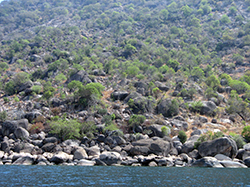
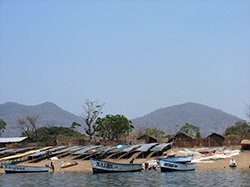
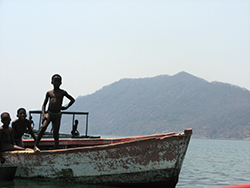
Malawi Support Report - Mvunguti
Lake Malawi, a world heritage which takes up 20% of the national land, is a beautiful turquoise blue lake with white sand beach surrounded by mountains. The length of the lake is 580km and it’s the third largest lake in Africa. Mvunguti is located along the shore inside Lake Malawi national Park. There is not much white sand beach in the village, people live on the rough mountains. The way to get to Mvunguti is mainly by boat through the lake, although there seems to be people who cut through the rough ridgeway.
We held VCT on April 11th and it was a scorching hot even it was still 8am. We carried large amount of maize flour to the loading point as we got stared at by young people hanging out in front of a super market and people who are trying to earn money by carrying luggage. It took 30 minutes to carry; I tried my best not to show any fear but my heart was pounding. I got really relived when my staff arrived and saw their faces.
We waited for the boat to arrive at the loading point for 20 minutes. The chartered boat doesn’t arrive. We got on the boat after 30 minutes of waiting from there. It was the first time to get on a boat with holes in the bottom. We had to get the water out form the boat as we cruised through the lake, but it felt good having pleasant breeze and flying spray of Lake Malawi in my face. The wind was strong at times and I got a bit scared but I felt like I was having the great scenery all to myself.
When we arrived at Mvunguti, there were tons of dried little fish stacked on the small beach. They looked like dried sardine. Even there were tons of fish, I was surprised that it didn’t smell that bad. I just felt happy seeing kids’ carefree smiles welcoming us warmly. They were filled with energy and jumping in the lake. No electricity, no water, no cell phone network. I thought to myself that convenience and happiness are not proportional. Complaints are in the convenient world.
The cove essential to the villagers’ living, is polluted with plastic bags and oil from boats. They also wash their body, dishes and clothes there. They can be seriously ill from drinking the polluted water. Toilets are juts hole on the ground which is also filthy. I think they can improve their water situation by setting toilets at the right location and cleaning up the human waste. To secure drinking water, I hope that water project will proceed quickly.

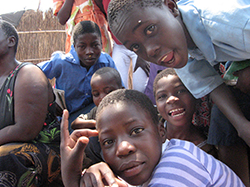
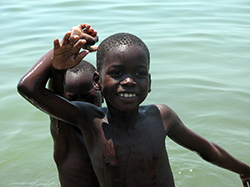
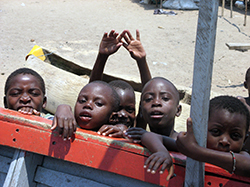
VCT
In Malawi, there are many people who get infected with HIV every year. AIDS is still the main cause of adult’s death. At the VCT at Mvunguti, 88 people on the first day and 112 people on the second day, total of 200 people showed up due to announcement from the volunteer staff. Volunteer staffs made posters and had them on the walls to let the villagers know.
The result, 60 of 200 were HIV+ and 36 of them were newly infected. We gave them maize flour to the people who tool VCT and gave biscuits to small children. IF they needed condoms, VCT staff would give them. Villagers here are very calm. Maybe the people who came to the test are the conscious ones, but volunteers and VCT staff were helping each other to make the test go smoothly. They gave advice to those who are suffering from other disease as well.
The regret was that not many fishermen came to the test. They are the ones who have high rate of HIV+. They contact people outside of the village and the concern is that they spread or bring back the disease. We need to have more fishermen at the test. We also held AIDS prevention education to young people (right knowledge of HIV, importance of using condoms, early detection, etc.).
HIV patients can prevent the development of the disease by taking anti-HIV drug but it’s difficult for them to maintain due to social and financial reasons. Especially in Mvunguti, there is no land route so it costs them money and takes time to get to the hospital. For the African JAG project for this visit to Malawi, we gave out 12 transportation tickets each to get to the hospital for the 36 people who had HIV+. Also, for the people who took VCT, we gave out transportation tickets to the people who had other diseases (tuberculosis, malaria, cholera, etc.).
Rate of malaria was high as usual so we donated 62 mosquito nets. We need more early detection for small children, raise awareness about AIDS prevention education, and also need to strongly encourage people to show up at the test. By cooperating closely with local volunteers, I’d like to address this issue.
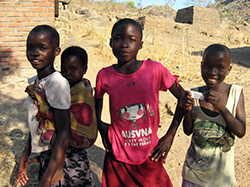
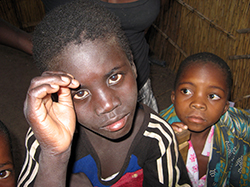
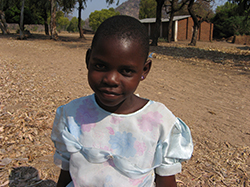
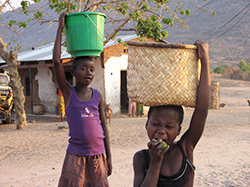
MSAKA
Msaka is a village by Malawi Lake just 10km away from Chambe with population of 12,000. There is no hospital or clinic and people need to travel to Monkey Bay about 30km away. It costs kw 1,000 (about ¥150) to get there and come back. Since the support in October 2010, we revisited there for the first time in 7 1/2 years and found so many issues in Msaka.
There used be no mobile phone network and they only had some shops but it was a very cohesive village. It seems an American NGO called US Aid launched Fish Project recently and many fishermen from surrounding villages and even far away have basing themselves here to distribute. Population has increased and there are food retailers and bars now. Fishermen get paid well and some were driving expensive cars like land cruiser. Fishermen who own boats were always getting paid well but it seems the amount has doubled. The economic difference between them and the villagers were obvious.
There is a chief in the village and the person owns definite power but fisheries cooperative and market is doing their business away from the chief. It is good that economy is getting better but problem can arise. Unless they make rule, I feel that the village can be separated easily.

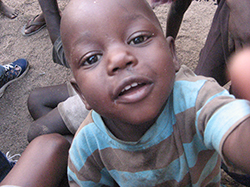
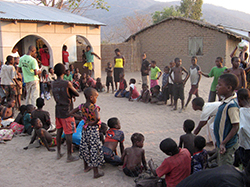
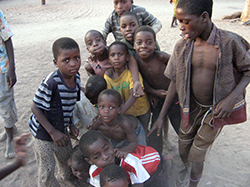
HIV / AIDS – CURRENT SITUATION & COUNTERMEASURES
We sponsored HIV / AIDS test (VCT) for 2 days. 121 people tested in the first day and 83 turned out to be positive (3 were new). About 68.6% is positive. 94 people tested the second day and 15 were positive. The number of positives decreased compared to the first day but this makes it total of 45% positive, which is a high percentage. In 2007 it was 26.7% and it decreased to 9% in 2009. So the percentage this year is a big problem. The first day of the VCT, there was a weight check for babies younger than 6 months old at a nearby park so their mothers came to take the test. 70% of the people tested that day were young mothers. In Malawi, mothers get HIV / AIDS test when they get pregnant and it they are positive, they take medicine and there will be no mother-to-child transmission. But mothers need to take medicine forever to stop the progression of the disease or they die. Do the mothers in poverty area have money to get to the hospital every month?
Although, there are issues regarding the transmission of women in this village. Many women are poor and they sleep with fishermen that come from different areas in exchange for fish. That is how they get the disease. Once one fisherman had given the disease to 8 young women in the past. The women have sex in exchange for fish to survive. If they had used condoms that would have not increased the percentage but the local condoms they get for free smell bad and thick. Men refuse to use it.
I have written his before but Japanese condoms are well made. I distribute Japanese condoms every time we had VCT and they all want more. Especially women in poverty area ask for more because they men willingly use them. We can only bring so much at once but we are hoping to work together with Japanese condom companies and provide more. Also, we are hoping to build a condom factory in Malawi where they have gum tree. It would be nice to manufacture condoms with Japanese flag on it and work with many African countries. It is a fact that if patients take HIV / AIDS medicine they can live normally like others, but people in poverty area cannot get to the hospital and they have no choice but to die in their villages. That is why they need to fundamentally get rid of the transmission. With that said, they can use the Japanese condoms if they work well. Giving away money like ODA does not work. The government and people need to hold hands and try to get rid of the disease fundamentally with Japanese technology. This is very important both for Japan and all poverty areas.
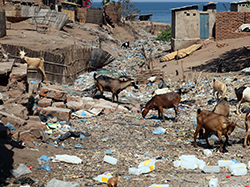
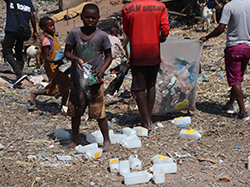
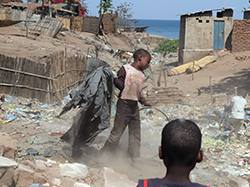
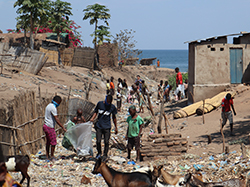
GARBAGE ISSUE - CURRENT SITUATION & COUNTERMEASURES
Villagers willingly started to clean the village in 2010. The village once got very clean but now there are plastic trash (mostly plastic bags) everywhere and it stops the water flow in the river. Mud like sludge is making a bad smell. In the rainy season the rain flows into the river and it pushes the plastic trash and mud to the lake. Fishermen from different area throws trash everywhere when they get drunk. Like the issue that UN is mentioning, stomachs of fishes are filled with plastic waste and they are dying. Many people in the village is affiliated with fishery so they are risking their own lives. If the village is accepting fishermen from other areas, they need to come up with a rule. Bars, markets and fisheries cooperative should not be too greedy. They should deal with this garbage issue.
We had help from children and picked up trash at the village as emergency treatment. Children would pick up plastic trash and they get biscuit in return. Maybe for the biscuit, many children helped and we had cleaned 9 bags full of plastic waste in an hour. Children would count the number of plastic wastes they picked up, then they washed their hands and receive the biscuits. Watching children in poverty area picking up trash and smiling with biscuits in their hands, it made us feel happy. An important thing is that they need to learn that they have to wash their hands. They need to learn to prevent having cholera and dysentery. Luckily the chief of the village is the president of the elementary school. He is now teaching children the importance of cleaning plastic waste and washing hands. This would be a mid / long term project. The last day, calligrapher Mami wrote a message on a sign. “NO FISH, NO LIFE.” Many fishes are dying from plastic waste all over the world. We need to not throw trash for our own sake… that is what we wrote and put it at a place with the most plastic trash. We do not know how much this would change the situation but it seems things get better with time. Next time we visit Msaka, we are planning to discuss this trash issue with the people from fisheries cooperative and markets. We hope to have signs everywhere and get rid of all trash.
Past Reports
※ Reproducing all or any part of the contents of this site is prohibited without author's permission.
